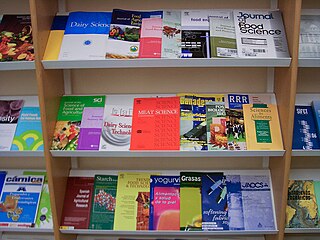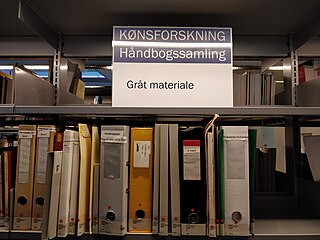Related Research Articles

A library is a collection of materials, books or media that are accessible for use and not just for display purposes. A library provides physical or digital access materials, and may be a physical location or a virtual space, or both. A library's collection can include printed materials and other physical resources in many formats such as DVD, CD and cassette as well as access to information, music or other content held on bibliographic databases.

Data storage is the recording (storing) of information (data) in a storage medium. Handwriting, phonographic recording, magnetic tape, and optical discs are all examples of storage media. Some authors even propose that DNA is a natural data storage mechanism. Recording may be accomplished with virtually any form of energy. Electronic data storage requires electrical power to store and retrieve data.
Electronic publishing includes the digital publication of e-books, digital magazines, and the development of digital libraries and catalogues. It also includes the editing of books, journals and magazines to be posted on a screen.

An academic journal or scholarly journal is a periodical publication in which scholarship relating to a particular academic discipline is published. Academic journals serve as permanent and transparent forums for the presentation, scrutiny, and discussion of research. They require peer-reviewed or refereed. Content typically takes the form of articles presenting original research, review articles, or book reviews. The purpose of an academic journal, according to Henry Oldenburg, is to give researchers a venue to "impart their knowledge to one another, and contribute what they can to the Grand design of improving natural knowledge, and perfecting all Philosophical Arts, and Sciences."

Digitization is the process of converting information into a digital format. The result is the representation of an object, image, sound, document or signal obtained by generating a series of numbers that describe a discrete set of points or samples. The result is called digital representation or, more specifically, a digital image, for the object, and digital form, for the signal. In modern practice, the digitized data is in the form of binary numbers, which facilitates processing by digital computers and other operations, but, digitizing simply means the conversion of analog source material into a numerical format; the decimal or any other number system can be used instead.
Legal deposit is a legal requirement that a person or group submit copies of their publications to a repository, usually a library. The number of copies required varies from country to country. Typically, the national library is the primary repository of these copies. In some countries there is also a legal deposit requirement placed on the government, and it is required to send copies of documents to publicly accessible libraries.
Hybrid library is a term used by librarians to describe libraries containing a mix of traditional print library resources and the growing number of electronic resources.

HeinOnline (HOL) is a commercial internet database service launched in 2000 by William S. Hein & Co., Inc., a Buffalo, New York publisher specializing in legal materials. The company began in Buffalo, New York, in 1961 and is currently based in nearby Getzville, NY. In 2013 WSH Co. was the 33rd largest private company in western New York, with revenues of around $33 million and more than seventy employees.
The International Federation of Library Associations and Institutions (IFLA) is the leading international body representing the interests of people who rely on libraries and information professionals. An independent, non-governmental, not-for-profit organization, IFLA was founded in Scotland in 1927 and maintains headquarters at the National Library of the Netherlands in The Hague. IFLA sponsors the annual IFLA World Library and Information Congress, promoting universal and equitable access to information, ideas, and works of imagination for social, educational, cultural, democratic, and economic empowerment. IFLA also produces several publications, including IFLA Journal.

Grey literature is materials and research produced by organizations outside of the traditional commercial or academic publishing and distribution channels. Common grey literature publication types include reports, working papers, government documents, white papers and evaluations. Organizations that produce grey literature include government departments and agencies, civil society or non-governmental organizations, academic centres and departments, and private companies and consultants.

A postprint is a digital draft of a research journal article after it has been peer reviewed and accepted for publication, but before it has been typeset and formatted by the journal.
The California Digital Library (CDL) was founded by the University of California in 1997. Under the leadership of then UC President Richard C. Atkinson, the CDL's original mission was to forge a better system for scholarly information management and improved support for teaching and research. In collaboration with the ten University of California Libraries and other partners, CDL assembled one of the world's largest digital research libraries. CDL facilitates the licensing of online materials and develops shared services used throughout the UC system. Building on the foundations of the Melvyl Catalog, CDL has developed one of the largest online library catalogs in the country and works in partnership with the UC campuses to bring the treasures of California's libraries, museums, and cultural heritage organizations to the world. CDL continues to explore how services such as digital curation, scholarly publishing, archiving and preservation support research throughout the information lifecycle.
Richard A. Danner was the Archibald C. and Frances Fulk Rufty Research Professor of Law Emeritus at Duke University School of Law in Durham, North Carolina. He held the position of Senior Associate Dean for Information Services and served in various capacities at Duke, starting in 1979, and was appointed Director of the Duke University Law Library in 1981. Prior to working at Duke, Richard Danner served as a law librarian at the University of Wisconsin–Madison, where he received degrees in law and library science.

In library and archival science, preservation is a set of preventive conservation activities aimed at prolonging the life of a record, book, or object while making as few changes as possible. Preservation activities vary widely and may include monitoring the condition of items, maintaining the temperature and humidity in collection storage areas, writing a plan in case of emergencies, digitizing items, writing relevant metadata, and increasing accessibility. Preservation, in this definition, is practiced in a library or an archive by a librarian, archivist, or other professional when they perceive a record is in need of maintenance.
Scholarly communication involves the creation, publication, dissemination and discovery of academic research, primarily in peer-reviewed journals and books. It is “the system through which research and other scholarly writings are created, evaluated for quality, disseminated to the scholarly community, and preserved for future use." This primarily involves the publication of peer-reviewed academic journals, books and conference papers.
The term born-digital refers to materials that originate in a digital form. This is in contrast to digital reformatting, through which analog materials become digital, as in the case of files created by scanning physical paper records. It is most often used in relation to digital libraries and the issues that go along with said organizations, such as digital preservation and intellectual property. However, as technologies have advanced and spread, the concept of being born-digital has also been discussed in relation to personal consumer-based sectors, with the rise of e-books and evolving digital music. Other terms that might be encountered as synonymous include "natively digital", "digital-first", and "digital-exclusive".
Digital artifactual value, a preservation term, is the intrinsic value of a digital object, rather than the informational content of the object. Though standards are lacking, born-digital objects and digital representations of physical objects may have a value attributed to them as artifacts.
Digital curation is the selection, preservation, maintenance, collection and archiving of digital assets. Digital curation establishes, maintains and adds value to repositories of digital data for present and future use. This is often accomplished by archivists, librarians, scientists, historians, and scholars. Enterprises are starting to use digital curation to improve the quality of information and data within their operational and strategic processes. Successful digital curation will mitigate digital obsolescence, keeping the information accessible to users indefinitely. Digital curation includes digital asset management, data curation, digital preservation, and electronic records management.
A digital library, also called an online library, an internet library, a digital repository, or a digital collection is an online database of digital objects that can include text, still images, audio, video, digital documents, or other digital media formats or a library accessible through the internet. Objects can consist of digitized content like print or photographs, as well as originally produced digital content like word processor files or social media posts. In addition to storing content, digital libraries provide means for organizing, searching, and retrieving the content contained in the collection. Digital libraries can vary immensely in size and scope, and can be maintained by individuals or organizations. The digital content may be stored locally, or accessed remotely via computer networks. These information retrieval systems are able to exchange information with each other through interoperability and sustainability.
National edeposit (NED) is a collaboration between Australia's nine national, state and territory libraries which provides for the legal deposit, management, storage and preservation of, and access to, published electronic material across Australia. It is a website, a system and a service, the result of a project by National and State Libraries Australia, and is a world-first collaboration. The National Library of Australia (NLA), Libraries ACT, Libraries Tasmania, Northern Territory Library, State Library of New South Wales, State Library of Queensland, State Library of South Australia, State Library Victoria and the State Library of Western Australia are the member organisations, while the system is hosted and managed by the NLA.
References
- ↑ Danner, Richard A. (2008). "Applying the Access Principle in Law: The Responsibilities of the Legal Scholar".
{{cite journal}}: Cite journal requires|journal=(help) - 1 2 "Durham Statement on Open Access to Legal Scholarship | Berkman Center". 2 March 2021.
- ↑ Danner, Richard A.; Leong, Kelly; Miller, Wayne (2011). "The Durham Statement Two Years Later: Open Access in the Law School Journal Environment". Law Library Journal. 103 (1).
- ↑ Rhodes, Sarah. "Preserving Born-Digital Legal Materials...Where To Start?". Cornell University Law School.